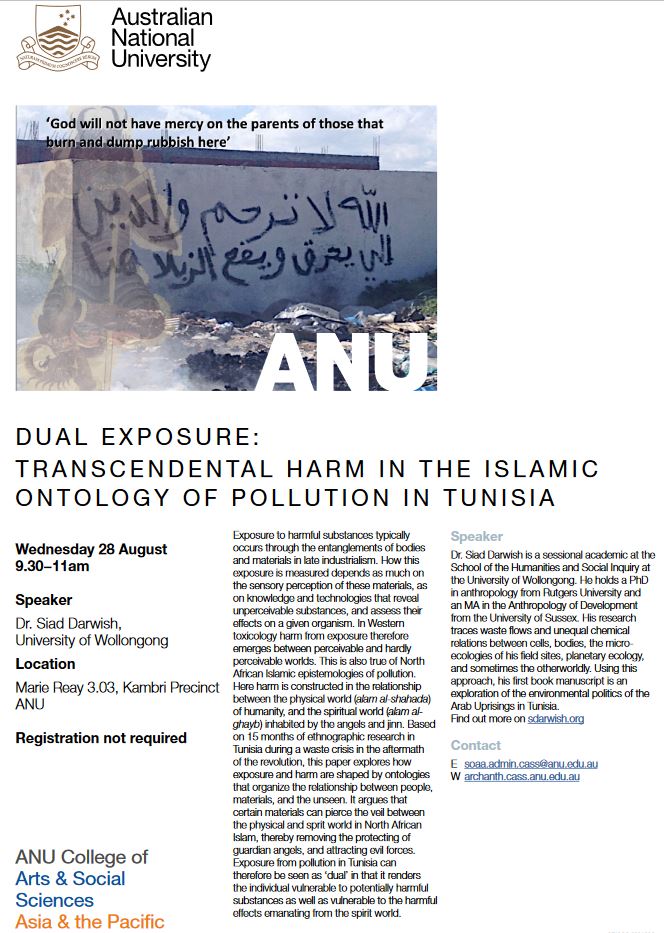 Exposure to harmful substances typically occurs through the entanglements of bodies and materials in late industrialism. How this exposure is measured depends as much on the sensory perception of these materials, as on knowledge and technologies that reveal unperceivable substances, and assess their effects on a given organism. In Western toxicology harm from exposure therefore emerges between perceivable and hardly perceivable worlds. This is also true of North African Islamic epistemologies of pollution. Here harm is constructed in the relationship between the physical world (alam al-shahada) of humanity, and the spiritual world (alam al-ghayb) inhabited by the angels and jinn. Based on 15 months of ethnographic research in Tunisia during a waste crisis in the aftermath of the revolution, this paper explores how exposure and harm are shaped by ontologies that organize the relationship between people, materials, and the unseen. It argues that certain materials can pierce the veil between the physical and sprit world in North African Islam, thereby removing the protecting of guardian angels, and attracting evil forces. Exposure from pollution in Tunisia can therefore be seen as ‘dual’ in that it renders the individual vulnerable to potentially harmful substances as well as vulnerable to the harmful effects emanating from the spirit world.
Exposure to harmful substances typically occurs through the entanglements of bodies and materials in late industrialism. How this exposure is measured depends as much on the sensory perception of these materials, as on knowledge and technologies that reveal unperceivable substances, and assess their effects on a given organism. In Western toxicology harm from exposure therefore emerges between perceivable and hardly perceivable worlds. This is also true of North African Islamic epistemologies of pollution. Here harm is constructed in the relationship between the physical world (alam al-shahada) of humanity, and the spiritual world (alam al-ghayb) inhabited by the angels and jinn. Based on 15 months of ethnographic research in Tunisia during a waste crisis in the aftermath of the revolution, this paper explores how exposure and harm are shaped by ontologies that organize the relationship between people, materials, and the unseen. It argues that certain materials can pierce the veil between the physical and sprit world in North African Islam, thereby removing the protecting of guardian angels, and attracting evil forces. Exposure from pollution in Tunisia can therefore be seen as ‘dual’ in that it renders the individual vulnerable to potentially harmful substances as well as vulnerable to the harmful effects emanating from the spirit world.
Dr. Siad Darwish is a sessional academic at the School of the Humanities and Social Inquiry at the University of Wollongong. He holds a PhD in anthropology from Rutgers University and an MA in the Anthropology of Development from the University of Sussex. His research traces waste flows and unequal chemical relations between cells, bodies, the micro-ecologies of his field sites, planetary ecology, and sometimes the otherworldly. Using this approach, his first book manuscript is an exploration of the environmental politics of the Arab Uprisings in Tunisia. Find out more on sdarwish.org.
